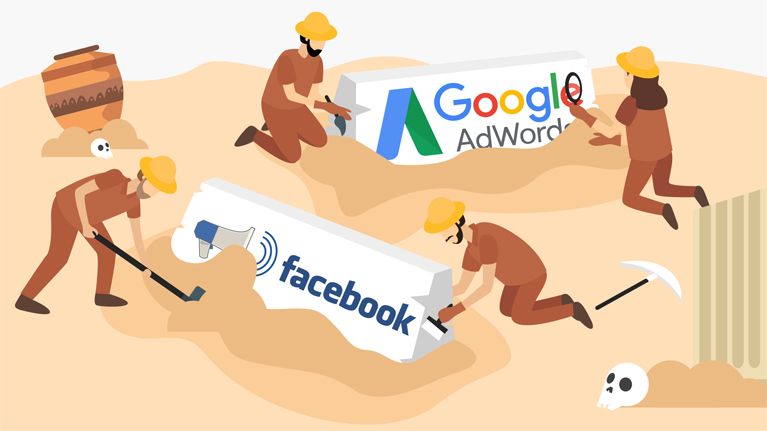The famed astrophysicist Carl Sagan once told us “You have to know the past to understand the present.” Today, real estate agents are looking for a competitive edge with Facebook and Google marketing without properly understanding (or remembering) the past. As you will see in this article, it is this very history that reveals where the best opportunities exist presently — and where the best opportunities will exist in the future!
Lead Generation Technology
I’ve been building complex real estate websites and marketing solutions since early 2007, and those twelve years feels like an ETERNITY considering how fast the online space has changed.
These days, and I’ll admit that this is very rare, we do still occasionally get sales inquiries asking if we can guarantee #1 rankings on Google...
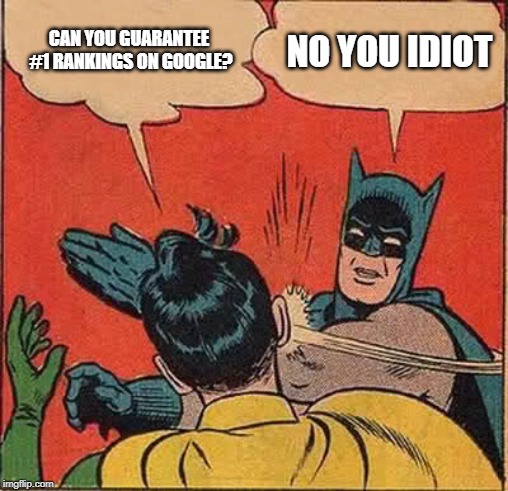
Now to be fair, the reason they’re asking, is because there was once a time when companies could guarantee #1 rankings on Google… for any and every real estate related term you could imagine.
So let’s go back to that time, and then work our way into the present, uncovering many valuable lessons along the way. ?
Google Search & Real Estate: How It’s Evolved
I built my first website when I was around 13 years old. Back then, if I wanted to rank #1 on Google for a certain keyword, I would just spam that keyword hundreds or thousands of times in the footer area of the website (matching the text color to the background so you couldn’t see it).
A few miles of white space on the bottom of a page may have seemed odd to site visitors, but it’s all you had to do to beat Google. Unsurprisingly, lots of people did it.
Over the years, Google made its ranking algorithm much harder to fool.
As a result, SEO companies sprang up all over the place. If you were trying to get your site ranked, at the time… and yes, yes what I’m about to say might be hard to believe… but… they were actually a good option.
Here Come the Backlinks
Around 2009, Google figured that if another website was linking to your website or a page on your website, that this was because you had something of quality that was worth sharing, and so they’d give you a boost — and with that, backlinks became a thing.
This was initially a good thing (and it made perfect sense), however, when people looking to cheat the system caught onto this, they created massive networks of websites whose sole purpose was to create links to other websites.
This was called ‘illegal backlinking’ and in SEO terms, was considered ‘black hat.’
- White Hat = Search engine optimization techniques that adhere to search engine rules and policies ?
- Black Hat = Search engine optimization techniques that violate search engine rules and policies ?
And so, with ‘illegal backlinking’, SEO companies could all but guarantee the first-place position for specific keywords.
These same companies charged thousands because they could, and for real estate agents that were buying, it was a great trade-off. Simply pay a few thousand dollars and get ranked #1 on Google for any keywords you wanted!
If you wanted to rank better but didn’t want to pay an SEO company… simple! Just pay some guy in India a few hundred dollars and he’d create hundreds or thousands of backlinks to your website for you to get you to rank #1 for any keyword you wanted.
At the peak of illegal backlinking, I was receiving multiple solicitations, daily, from individuals selling backlinking services, and I had lots of clients that participated and reaped the benefits and were absolutely thrilled…
Until…
Google’s “Panda” Update and What That Meant for Real Estate Websites
Google’s ‘Panda’ update in 2011 and 2012 caused a substantial upheaval in how content was ranked and shown to its user base. This update marked the time when Google started looking at the actual quality of the links coming into your website.
Uh oh.
This was such a big thing, that it was one of two videos that I summoned the courage to make during that time.

So what do you think happened to websites that had thousands of links from completely non-related websites in India? Adios amigo! ✌
Virtually overnight, thousands of real estate websites went from #1 rankings for hundreds of keywords, to total obscurity.
Blacklisted. From Page 1 to page 50 of the Google Search results… if that.
The Panda update brought with it the differentiation between high-quality and low-quality links.
- High-Quality Link: A link that comes from a trusted, and ideally related source. For real estate websites, high-quality links were those that came from other real estate or real estate related websites, who had high rankings themselves. This was often industry related services, like local vendors, your lender’s website, or people you’ve done business with.
- Low-Quality Link: A link that comes from a non-related source. Low-quality links will actually hurt your site ranking. If you accumulate too many, Google will assume that you’re trying to cheat the system and actually blacklist your website.
As of today, High-Quality and Low-Quality backlinks continue to be an important part of Google’s ranking algorithm.

Google Search & Real Estate: Where Are the Current Opportunities?
Here’s the important takeaway from all of this.
Since Google first launched in 1998, and with every update to their algorithm, they have always, always, always maintained one key objective: find the content that provides the most value to end users, and rank it in the top.
If you’ve paid for SEO services in the last handful of years, I’m willing to wager that you got ripped off. SEO companies often continue to focus on meta keywords, which do nothing for your content’s rankings.
I’ll get into the details of that in another article, but for now, this can be summed up pretty easily: Google’s algorithm is harder than ever to ‘game’. Finding an SEO company that’s worth their salt is like finding a unicorn. ? I’m not saying that they don’t exist, but I’ve never encountered one and I certainly don’t believe the search for one to be worth it.
This is because effective SEO strategies today must revolve tightly around engaging, high-quality content … period.
Quick Tips Regarding SEO Management:
Ranking organically for specific keywords can definitely still be viable in this day and age. I believe it to be a good long-term strategy, but you need to focus on value — and you also need to use a little common sense.
If you’re paying a 3rd party company to SEO Optimize a page, or you yourself are stuffing keywords into a page attempting to make them rank better, you’re not only wasting time, you could be hurting your site with duplicate content.
It’s better (and about 10x cheaper) to use a 3rd party tool to improve your website’s SEO.
Here at AgentFire, we love and use Yoast SEO! This handy plugin is used on our main website (the one you’re reading right now) and is included with every customer website build we create. It’s a great option for anyone with a WordPress website.
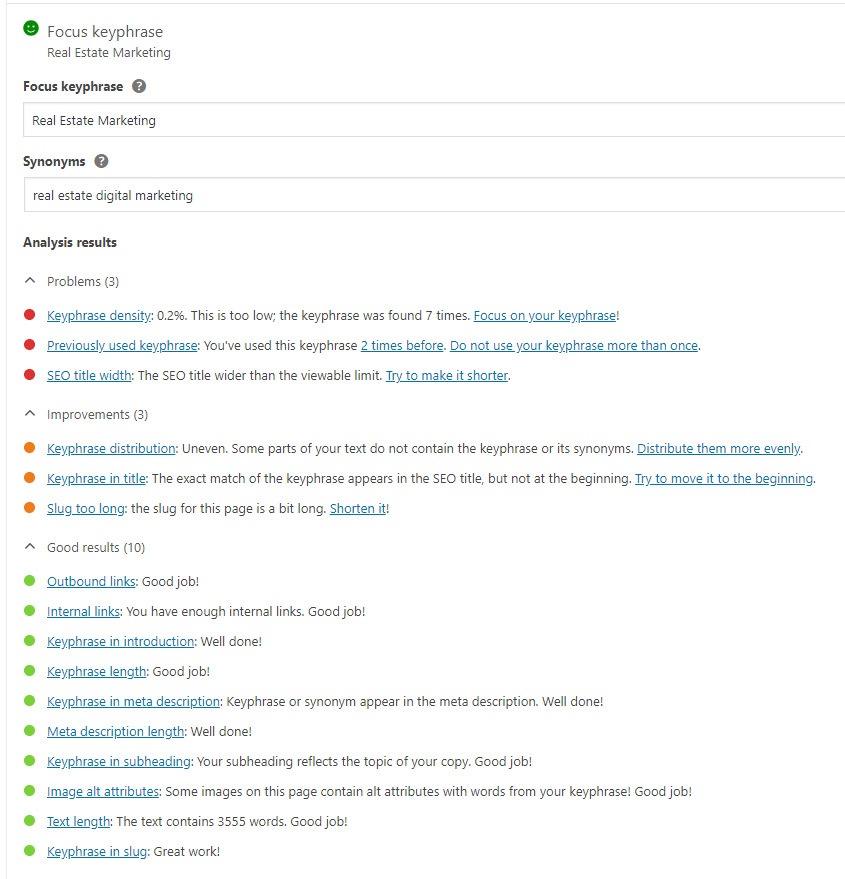
Yoast’s analysis tool will run an SEO diagnosis on any page or post. It will make recommendations for how to improve your SEO without being spammy. The analysis module focuses on helping you deliver your content the way Google and search engines want to see it.
Bottom line: Your content strategy must be built on the foundation of providing value above all else.
Considering the way Google’s algorithm has evolved, your SEO results rely heavily on your content strategy.
Google’s algorithm now looks at:
- How long people are viewing your content…
- If it was ‘liked’ via social networks…
- How many times it was shared…
- If it was revisited…
- And more.
A piece of quality content is going to score high marks on all of the above.
The client of ours that I think has the best overall blog content has to be BairdWarner
What I think makes it really special is how they focus on articles that provide high value to people living (or interested) in the area. They’ve got a series called “The Vault” that dives into the history of the area, and they frequently do Neighborhood Video Spotlights.
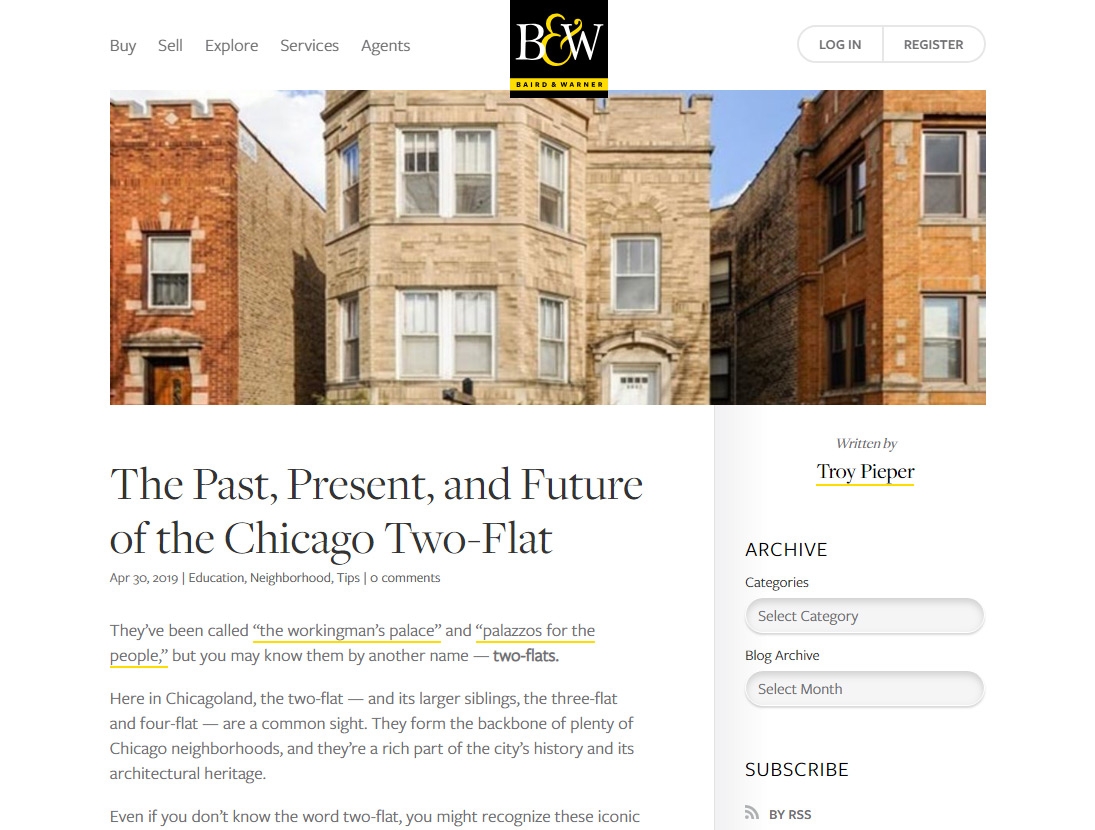
Not only are their articles interesting and engaging, but they clearly demonstrate them as the local area experts.
The History of Google Adwords for Real Estate
Google Adwords launched in mid-2000 and is now used by over 1 million advertisers.
In my opinion, it’s the most poorly-utilized online marketing platform by real estate agents.
Yes, it’s even worse than Facebook, but more on that in a second.
What makes Adwords great is that Google Search is intent-based. Facebook is interest-based. People go to Google with something specific that they’re searching for. The best strategies for Google are not necessarily the best for Facebook.
Most agents have either given up on Google Adwords or continue to see a negative ROI over time. Competition on top level keywords stiffens every year. It’s important to know that Zillow, Trulia, and Realtor.org are now also competing for these keywords, so the average Cost Per Click for each keyword has gone up substantially.
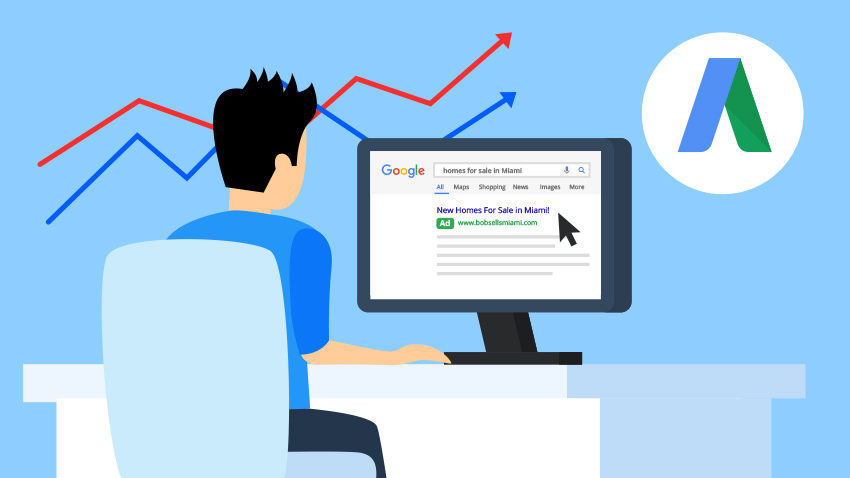
Here are the opportunities as I see them:
- City Keywords — Yes, I just said a second ago that competition has gone up on these keywords substantially. However, the vast majority of agents paying for these keywords are not seeing a positive ROI, and it’s because of their own execution. If you’re going to target city keywords, you need to make sure that you’re not just arbitrarily directing this traffic to your homepage. It needs to be directed to a city-specific landing page that provides a lot of value and has a compelling call to action. Directing traffic is only worth the investment if you’re converting it.
- Neighborhood Keywords — These are much less competitive. Overall search volume is lower, which means your Cost Per Click will also be lower. If you’re directing traffic to a compelling landing page with a value-based call to action, you’ll get more conversions than city keywords. That statement is backed by data but just think of it from a common sense standpoint. Someone searching ‘Naples Real Estate’ is undoubtedly much earlier in the process than someone searching for a specific neighborhood within Naples.
- Best Agent In {AreaName} — This is a great keyword combination to target especially if you’re directing traffic from these results to a landing page touting your accomplishments and/or offering a compelling call to action. This can be as simple as an offer to reach out to you with a question, to set up a meeting, or to have a cup of coffee.
- Google Remarketing — I should probably put this at the top of the list, and here’s why… Out of the $220k plus in real estate online adspend I’ve managed over the last 3 months (and the many millions over the last few years), Google Remarketing continues to be the highest overall ROI that I’ve seen exist in real estate — when it’s done correctly.
So in short, there are still tons of great opportunities, just don’t expect to target ‘city real estate’ without a properly optimized landing page in place, along with conversion options displayed for capturing that traffic as a lead.
AgentFire has actually built an entire system for maximizing ranking and engagement for city & neighborhood keywords to make the value proposition easy to provide. It’s called Area Guides, and I’m the proud father. If you’d like more information, you can check it out on our tour page, or check out this video overview.
IDX & The Rise of Zillow
IDX has a very interesting history, and it’s nature and relevance have changed more rapidly than anything else I’ve listed above.
In the not too distant past, online listing syndication platforms like Zillow didn’t exist. If you wanted to search for homes online, you had to do it through the IDX website of a local agent or broker.
Then around 2011, integrated IDX arrived on the scene. Before that, IDX feeds had always utilized iframes — which are invisible to search engines. But with the introduction of integrated IDX, search results and individual properties on your website could actually be indexed by Google.
This was a game changer.
The real estate agents who quickly hopped on this train soon saw themselves ranking in the top spots for thousands of different searches, and absolutely dominating searches for individual properties.
Ranking in the top spot for an example like ‘123 Apple Street, Cedar, Nevada’ may not bring in loads of traffic on its own. However, when you’re ranking in the top few spots for every single listing in your MLS, and those top rankings actually help you to rank for other, more competitive city and neighborhood keywords, well… it made a huge difference. Especially considering that people searching for a specific address are much more likely to be further along in the buying process.
IDX Everywhere
Over the next few years, most IDX providers hopped on the integrated IDX train. This increased competition, and websites with these features exploded in number. ?
One consequence of this was that a lot of identical page content now needed to be reviewed by Google’s site crawling algorithms, and that presented new challenges for search providers.
Meanwhile, Zillow started to gain more and more traction.
Today, IDX companies, for the most part, have completely failed to come into 2018. They’ve failed to recognize Zillow’s’ market dominance. They’ve also failed to address the issues surrounding value and original content.
As a result, most of these platforms are still mostly focused on offering similar, but vastly inferior experiences.
New Ways to Compete in the IDX Space
One bright spot within the integrated IDX category is ShowcaseIDX. Their most recent update is the first real attempt by any IDX provider I’ve seen to really sit down and identify what they can uniquely provide that Zillow cannot. I made a video review (less than 2-minutes long) about ShowcaseIDX, which you can check out here if you’re curious.
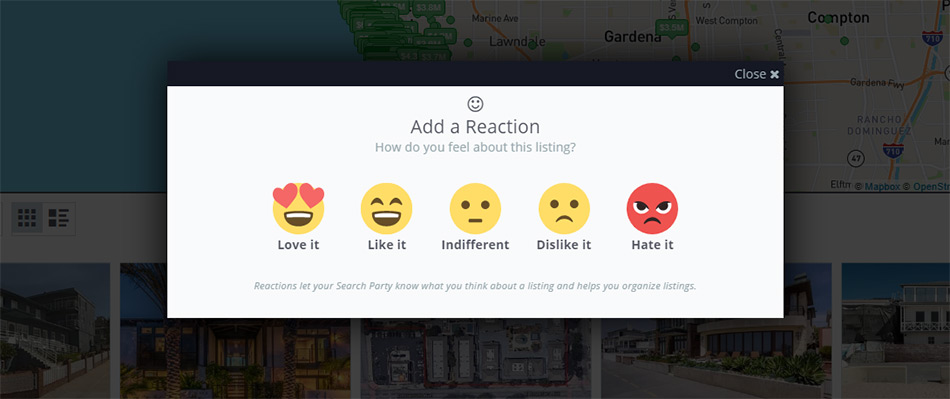
Full disclosure, they are the main IDX that we integrate with… but we integrate with them because we feel that they’re the best IDX solution on the market by a long shot.
I see a lot of real estate agents still extremely focused on the SEO of their IDX – and while there’s still some potential here, it’s minimal.
The (Somewhat Brief) History of Facebook Marketing for Real Estate
Facebook marketing is relatively new. There’s no long history we can use to draw conclusions from.
So before we go any further, big thanks to Gary Vee. I’m giving him all of the credit. Facebook marketing currently has the biggest buzz of any online marketing source for real estate agents.
6 months ago, nobody was talking about it.
Now I can’t remember the last time we had a product demo where the interested party didn’t mention Facebook marketing.
I think Facebook has a tremendous amount of opportunity. As is the case with most online marketing platforms, it requires a little effort. The challenge I see is that most agents have no idea how to use it, or are using it horribly wrong. ?
What makes Facebook unique is that it’s interest-based marketing. On Google, someone types in a specific set of keywords or a question. On Facebook, you’re marketing to individuals based on their age, sex, income levels, interests, marital status, etc.
The most effective campaigns that we’ve created all follow this basic formula:
- Understand the Niches within your Market — Every market is different. So for example, if you’re in a market that’s known for a particular school district, that’s a niche. If you’ve got a lot of highly desirable new construction going on, that’s a niche. If you’re in a ‘2nd homes’ market, you should be focusing on the ‘2nd homes’ niche.
- Figure out an ‘Offer’ for that Market — The easiest and best offers are often just curated IDX searches presented as a list. Using school districts as an example, you could offer ‘top homes in the XXX school district’. Funnel the traffic from the ad to a landing page by offering instant access to that list in exchange for the user’s contact information. When users opt-in on your landing page, they should then be redirected to an IDX page showing listings in the school district you were advertising. This is basically the complete reverse of organic listing ranking. It’s also effective because you’re sending the right value to the right audience.
- Analyze Facebook Targeting Options — The first step is to effectively target your audience. Your niche and your offer don’t mean squat unless you can effectively market them to a target audience. In the case of creating an ad for someone likely to buy in a specific school district, you could use the following targeting options to create an audience:
- Areas around, but not in, that school district.
- Have or are expecting children.
- Are currently renting.
- Married.
- Are between a certain age range.
- Households that make more than $XX/year or have $XXX in net worth.

Facebook & Google Remarketing Opportunities for Real Estate: The New Frontier
The other big opportunity that I see within Facebook and Google, is in their remarketing capabilities.
Remarketing on Facebook or Google will give you the HIGHEST ROI possible for every marketing dollar you spend.
Real estate agents absolutely NEED to set up a remarketing campaign for their business!!
And here’s why:
Without a remarketing campaign, 98% of all your website’s traffic won’t convert into a lead, and they’ll never return to your website. But with a remarketing campaign, that 98% of visitors that didn’t convert will see your advertisements all over the internet for up to 180 days after that one visit to your website.
This is obviously a huge opportunity for a second chance at converting more of your website traffic.
Here’s the gist of how remarketing works:
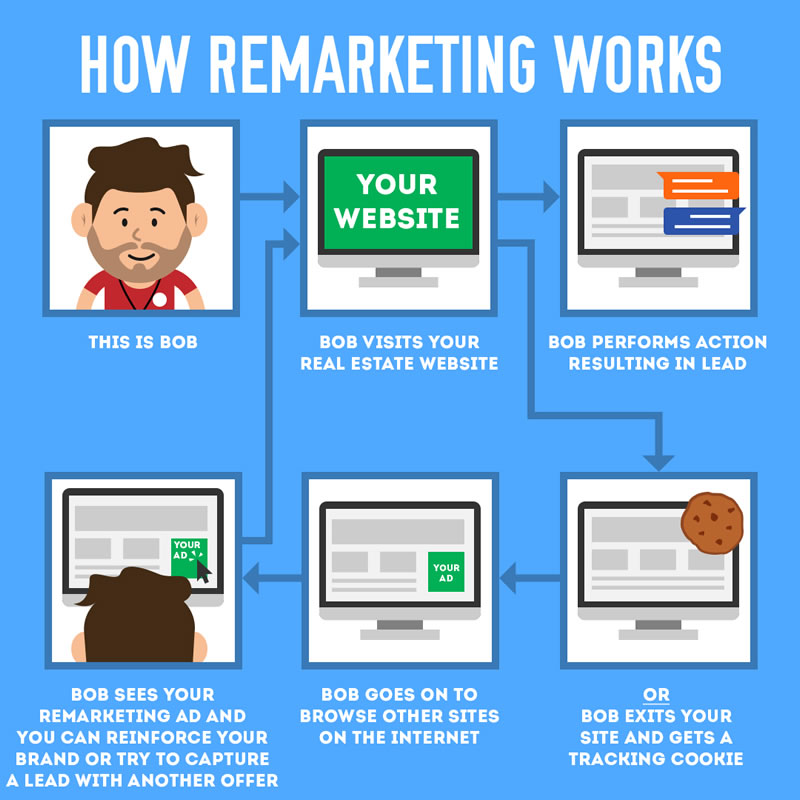
One of the best things about ‘Facebook remarketing’ is that you’re generally only showing ads to people who have visited your site or a specific page on your site. This means your impressions will be low, but the cost will be ultra-low.
It also means you have an ultra-interested audience because you know they already visited your website. Unless the site visitor was your mother, it’s highly likely their initial visit was intentional.
So, for me to explain remarketing the right way, I’ll need to dedicate an article solely to the topic. I’m actually in the process of creating a massive article detailing the ins-and-outs of it all, so if you haven’t already, make sure to subscribe to our newsletter!
And in the meantime, you can learn more about remarketing by reading Step 7 of our full Facebook marketing case study.
Conclusion(s)
Google Search
Google Search has been around for a while now, and if you consider where it started and how it’s algorithms have evolved, it’s a safe bet to assume that their algorithms are going to get better and better at ranking the content that provides the most value higher up in their search results.
They’ll also probably get better and better at subtly ranking and penalizing content in relation to how it fits their own political narratives and corporate interests, but that’s a topic for a much different article and not something that you have to worry about when it comes to trying to rank better for hyperlocal real estate related type searches. ?
Google Adwords
Google Adwords may seem like it’s passed it’s prime, but there are still great opportunities, and it’s extremely important to understand that your ROI depends not just on Cost Per Click, but on what sort of landing pages and value you’re using to drive conversion, because clicks do not inherently equal conversions, and conversions do not inherently equal new business. I’ll take a $50 lead for someone that searched for ‘best real estate agent in XXX area’ and filled out a ‘let’s chat’ form all day over $10 forced IDX registration leads.
Facebook Marketing
Facebook Marketing is still very much in its infancy, and the best ROI is undoubtedly in understanding and leveraging their demographic and location targeting options to create likely buyer & seller audiences, and then to craft an ‘offer’ that resonates. Again, think hyperlocal here.
IDX
IDX may not be the conversion powerhouse that it once was, but smart IDX companies like ShowcaseIDX will find ways to innovate and provide value on a micro (hyperlocal) level that Zillow and other giant search portals will generally neglect in favor of the mass market.
If you ask me what should be your one absolutely essential real estate marketing staple, it’s Facebook and Google remarketing. It’s simultaneously the best current opportunity for a solid ROI and the most missed opportunity I see when talking with real estate agents who run their own marketing. So again, if you haven’t already, make sure to subscribe to our newsletter and look out for that massive remarketing article I’m working on right now!
And hey, if you’re looking for a killer real estate website solution that has great built-in SEO optimizations and tools, plus an entire system that helps you to rank and provide value on a hyperlocal level, why not check out a AgentFire Site?
Do you have any of your own thoughts about the past or future of real estate marketing on Facebook, Google, and beyond? Maybe your own SEO war stories? ?I’d love to hear your thoughts or any other feedback in the comments below!
